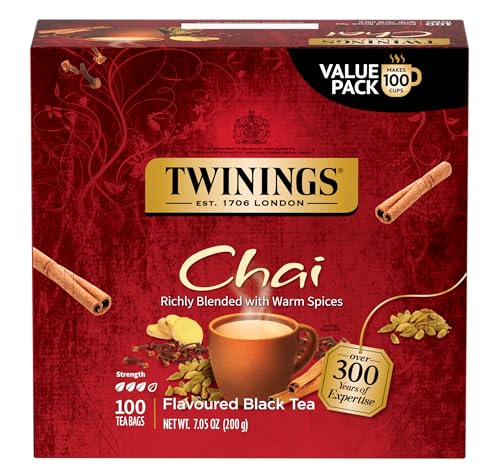As an Amazon Associate I earn from qualifying purchases.

Graphic by fivestarslist.com
But does chai tea have caffeine?
Yes, it does. The caffeine content in chai tea comes from its primary ingredient, black tea. However, the amount can vary depending on the preparation and the amount of black tea used.
This article aims to provide a comprehensive understanding of chai tea. We’ll delve into its caffeine content, compare it with other caffeinated beverages, and explore its potential health benefits.
Whether you’re a tea enthusiast, health-conscious individual, or someone looking to manage their caffeine intake, this article is for you. Let’s embark on this journey to discover more about the fascinating world of chai tea.
What is Chai Tea?
Chai tea, often called masala chai, is a spiced tea blend with roots in India. It’s more than just a drink; it’s a cultural experience.
The base of chai tea is typically black tea, known for its robust flavor and caffeine content. This forms the foundation of the beverage, providing depth and body to the brew.
A vital component of chai tea is the aromatic spices. These usually include cardamom, cinnamon, ginger, cloves, and black pepper. Each spice adds its own unique aroma and health benefits.
Chai is traditionally prepared by boiling tea and spices with water and milk. This process helps infuse the rich flavors, creating a creamy, fragrant concoction. Sweeteners like sugar or honey are often added, balancing the spices and enhancing the taste.
Over time, chai tea has evolved. It has adapted to suit various preferences, leading to different versions worldwide. From bustling Indian streets to modern coffee shops, chai continues to warm hearts and delight taste buds globally.
Caffeine Content in Chai Tea
Chai tea contains caffeine, mainly from its black tea base. However, its caffeine content is lower compared to coffee.
The average cup of chai tea has about 20-40 milligrams of caffeine. Meanwhile, a typical cup of coffee contains around 95 milligrams of caffeine.
The amount of caffeine in chai can vary. Factors like the type of black tea used and the brewing time have a significant impact.
A longer brewing time can result in higher caffeine levels. Similarly, using more tea leaves increases caffeine content.
It’s essential to note that the spices in chai do not contribute caffeine. The flavorful blend of spices adds taste, not energy boosts.
Many enjoy chai for its softer caffeine hit. It offers a gentle energy lift without the jittery feeling often associated with coffee.
Chai tea also contains theanine, an amino acid found in tea. This compound is believed to promote a calm state while maintaining alertness.
Here is a list of caffeine comparisons that highlights chai’s caffeine content:
- Chai tea: 20-40 mg of caffeine
- Black coffee: 95 mg of caffeine
- Green tea: 30-50 mg of caffeine
- Espresso: 63 mg of caffeine per shot
Understanding these caffeine levels helps manage intake. For many, chai offers a balanced alternative to stronger caffeinated beverages.
Chai tea’s caffeine profile can complement various lifestyles. Whether for a morning routine or an afternoon pick-me-up, it fits seamlessly into daily life.
Chai remains popular among those keen on moderate caffeine intake. Its blend of taste and health benefits adds to its appeal for diverse audiences.
Factors Influencing Caffeine Levels in Chai
Several elements can alter the caffeine content in chai tea. Primarily, the quality and type of black tea are key factors.
High-quality teas often have distinct caffeine levels. This can influence the overall concentration in the final chai mixture.
The steeping process also affects caffeine. Longer steeping times usually lead to higher caffeine extraction from the tea leaves.
The tea-to-water ratio matters too. More tea leaves in relation to water will naturally result in a stronger brew, impacting caffeine.
Additionally, any adjustments in brewing methods can change caffeine levels. Even slight variations in temperature can have an effect.
Moreover, some chai variations employ different base teas. For instance, green or white tea chai options offer altered caffeine amounts.
Understanding these factors allows for better personalization. It becomes easier to brew chai tea that aligns with individual caffeine preferences.
For those sensitive to caffeine, experimenting with these variables can offer insight. It may lead to a more enjoyable chai tea experience.
Changes in preparation aren’t limited to tea selection. Milk and sweetener additions also play a role in the final feel of the beverage.
By considering these influences, chai enthusiasts can better manage their caffeine intake. This encourages a tailored approach to savoring their favorite tea.
Health Benefits of Chai Tea
Chai tea is not only delightful but also offers numerous health benefits. The combination of black tea and spices provides an impressive nutrient profile.
Black tea itself is rich in antioxidants. These compounds help protect cells from oxidative stress and damage caused by free radicals.
The spices in chai also add to its health benefits. Popular ingredients like ginger, cinnamon, and cardamom are known for their wellness properties.
Ginger is widely acknowledged for its role in aiding digestion. It can help reduce nausea and improve gut health.
Cardamom and cinnamon boast anti-inflammatory properties. They can aid in reducing inflammation and promoting overall wellbeing.
Chai tea may support cardiovascular health as well. Antioxidants in black tea contribute to heart health by improving cholesterol levels.
Drinking chai offers an energy boost thanks to its caffeine content. However, it also helps maintain a calmer state due to the amino acid theanine.
Here’s a quick list of chai tea’s potential health perks:
- Improved digestion and gut health
- Reduced inflammation and oxidative stress
- Support for cardiovascular health
- Gentle energy boost with mental calmness
Ultimately, chai tea is both a delicious and healthy beverage option. It combines taste with potential wellness advantages to suit a balanced lifestyle.
Antioxidants and Anti-inflammatory Properties
Chai tea is a powerhouse of antioxidants. These substances play a crucial role in maintaining good health and preventing disease.
Antioxidants in black tea help combat oxidative stress. This, in turn, may reduce the risk of chronic diseases like heart disease and cancer.
Moreover, the spices in chai add even more antioxidant capacity. Cinnamon and cardamom are especially potent antioxidant sources.
The anti-inflammatory properties of these spices are significant. They assist in reducing inflammation, which is linked to many illnesses.
Regular consumption of chai may enhance overall antioxidant intake. This may contribute to slower aging and improved cellular health.
Overall, chai tea provides a balanced blend of antioxidants and anti-inflammatory benefits. It’s a beverage that promotes both wellness and enjoyment.
Digestive Health and Other Advantages
Ginger in chai tea is renowned for its digestive benefits. It can assist in easing digestion, reducing bloating, and alleviating nausea.
Many people rely on ginger for gastrointestinal comfort. In chai, it melds with other spices to create a soothing digestive aid.
Beyond digestion, chai tea may impact weight management. The compounds in its spices might help enhance metabolism and fat burning.
Another advantage is chai’s ability to stabilize blood sugar levels. Cinnamon in chai is linked to better regulation of blood sugar.
The potential benefits extend to enhanced cognitive function. Caffeine, though moderate, together with theanine, can improve focus and mental clarity.
These diverse health benefits make chai tea a desirable daily drink. It nourishes the body while providing comforting flavors and aroma.
Incorporating chai tea into your routine offers more than just caffeine. It’s a habit that merges indulgence with health-conscious choices.
Chai Tea vs. Other Caffeinated Beverages
Chai tea stands out among caffeinated drinks due to its unique blend of flavors and moderate caffeine content. Unlike some other teas, its ingredients offer more than just caffeine. Black tea forms the base of chai, contributing its caffeine and beneficial properties.
In contrast, coffee is often chosen for its high caffeine level. Many people enjoy coffee for an instant energy boost. However, the strong caffeine content can sometimes lead to jitters or a rapid energy crash.
Tea, in general, is known for its lower caffeine levels compared to coffee. Chai provides a gentler energy lift with added health benefits from spices. It allows consumers to enjoy caffeine in moderation while savoring distinct flavors.
Other popular caffeinated options include green and oolong teas. Although these teas also offer health benefits, they lack the warming spices found in chai. These factors make chai a particularly appealing option for those seeking variety.
When comparing caffeine and health perks, consider:
- Caffeine content: Chai < Coffee
- Health benefits: Chai offers spices
- Taste profile: Chai with spices, Coffee’s robust taste
Overall, chai tea brings a balanced mix of taste and caffeine that appeals to many who seek a soothing yet invigorating experience.
Coffee and Green Tea Comparisons
Comparing chai tea to coffee highlights different caffeine experiences. Coffee offers a quick, potent boost. This high caffeine level is ideal for those needing immediate energy. However, it may not suit those sensitive to caffeine.
Green tea, on the other hand, usually has less caffeine than both chai and coffee. It provides a more subtle energy enhancement while being rich in antioxidants. Green tea is often favored for its mild taste and health benefits.
In terms of flavor, chai tea outshines with its rich and complex spice mixture. Coffee is known for its deep, roasted flavors. Green tea typically has a lighter, more herbal taste profile.
For those preferring a moderate caffeine intake, chai is an excellent choice. It offers a middle ground between the strong kick of coffee and the gentle lift of green tea.
Choosing between chai, coffee, and green tea often depends on caffeine needs and flavor preferences. Each has its own benefits. Savoring a cup of chai introduces spicy nuances that transform a regular beverage into a delightful experience.
Managing Caffeine Intake with Chai Tea
Managing your caffeine intake doesn’t mean giving up all your favorite beverages. Chai tea offers a solution with its moderate caffeine levels. This makes it an appealing choice for those seeking balance.
Chai tea provides a gentler energy lift compared to coffee. Its lower caffeine content is suitable for those sensitive to strong stimulants. This allows individuals to enjoy a boost without experiencing negative side effects like jitters.
By incorporating chai tea, you can maintain control over your total caffeine consumption. It fits well into a lifestyle aimed at reducing caffeine while retaining the pleasurable ritual of a warm drink.
Furthermore, making chai at home enables you to adjust its caffeine level. You can alter the tea’s strength by changing steeping times or the amount of black tea. This flexibility helps personalize your beverage to meet your specific caffeine preferences.
Including chai tea in your routine can enhance energy management, ensuring you get a pleasant lift throughout the day.
Decaffeinated Chai Options
For those who wish to avoid caffeine altogether, decaffeinated chai tea is an excellent option. These versions preserve the iconic spices and flavors, providing enjoyment without the caffeine.
Decaffeinated chai allows individuals to enjoy multiple cups per day. It prevents overstimulation, particularly in those very sensitive to caffeine’s effects.
In addition, decaffeinated alternatives are suitable for evening consumption. This means you can unwind with a comforting beverage without disturbing your sleep.
How to Make Your Own Chai Tea
Creating your own chai tea at home is a rewarding process. It allows you to control the ingredients and customize the flavor to your liking.
Start by gathering black tea and your choice of spices. Common spices include cardamom, cinnamon, ginger, and cloves. The use of fresh spices can enhance the flavor profile significantly.
First, heat water in a pot and add the spices. Let them simmer for a few minutes to release their aroma and essence. This step is crucial as it infuses the base with rich spice flavors.
Next, add black tea leaves to the simmering mixture. Let it steep for a few minutes, adjusting the time according to your desired caffeine strength. This is where the caffeine content can be controlled effectively.
After steeping, add milk and sweeteners like honey or sugar. This softens the blend, providing a creamy texture typical of chai. Adjust the milk and sweeteners to suit your taste preferences.
Finally, strain the mixture into cups and enjoy your homemade chai tea. This simple method delivers a flavorful beverage, offering full control over taste and caffeine.
Customizing Your Chai: Flavor and Caffeine Control
One of the joys of making chai tea at home is customization. You can adjust the flavor and caffeine level to fit your mood and needs.
To vary the flavor, experiment with different spice combinations. Try adding nutmeg or a dash of vanilla for a unique twist. Each spice brings a different aroma, enhancing the chai experience.
The caffeine content is also easy to tailor. Reduce the steeping time or tea quantity for a milder chai. This makes it possible to enjoy multiple cups throughout the day.
You might also consider caffeine-free teas as your chai base. Herbal tea or rooibos can substitute for black tea. These alternatives retain the warm, spiced character of chai without the caffeine.
Additionally, milk alternatives like almond or oat milk can offer new tastes. These choices are great for those following plant-based diets or seeking novel flavors.
Experimentation leads to a chai that truly reflects your personal taste. Enjoy the process of discovering different blends and levels of energy.
Conclusion
Chai tea is more than just a beverage; it’s a global tradition. With its distinctive flavor, it offers a sensory journey unlike any other drink. Its caffeine content is modest, providing a gentle energy boost.
Beyond caffeine, chai offers numerous health benefits. The spices contribute to both taste and wellness, making chai a holistic addition to any diet. Its capacity to support digestion and offer anti-inflammatory properties is significant.
Creating chai at home allows for personal expression. You can adjust flavors and caffeine levels, customizing it to your needs. Embrace this chance to bring warmth and aroma to your daily routine.
Embracing the Chai Experience
Chai tea is a celebration of spices and culture, inviting moments of calm and enjoyment. It’s a drink that nurtures both body and spirit.
Enjoy crafting and drinking chai, savoring each sip as a special experience. Let it transport you to a place of comfort and tradition.
Image source: Amazon Product Advertising API
Amazon and the Amazon logo are trademarks of Amazon.com, Inc, or its affiliates.
Last update on 2025-04-24 / Affiliate links / Images from Amazon Product Advertising API






